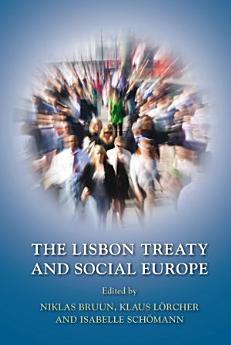The Lisbon Treaty and Social Europe
Niklas Bruun · Klaus Lörcher · Isabelle Schömann
Mai 2012 · Bloomsbury Publishing
E-Book
348
Seiten
reportBewertungen und Rezensionen werden nicht geprüft Weitere Informationen
Über dieses E-Book
On 1 December 2009 the Treaty of Lisbon entered into force. Although often described as primarily technical, it significantly amended the Treaty on the European Union (TEU) and the old EC Treaty (now the Treaty on the Functioning of the European Union, TFEU). The authors' aim in this book is to explore what the Treaty means for social law and social policy at the European level. The first part of the book on the general framework looks - at a time of financial crisis - for new foundations for Europe's Social market economy, questions the balance between fundamental social rights and economic freedoms, analyses the role of the now binding Charter of Fundamental Rights, maps the potential impact of the horizontal clauses on social policy and addresses the possibilities for social partners to enlarge their role in labour law and industrial relations.
The second part, on the social framework of the Treaty, focuses on the development of the Union's competences. In it the authors evaluate the consequences of the new general framework on social competences, analyse the evolution of the principle of subsidiarity and its impact in the new Treaty, look at the coordination of economic policies in the light of fundamental rights, and analyse the adoption in the Treaty of a new architecture for services of general interest.
The second part, on the social framework of the Treaty, focuses on the development of the Union's competences. In it the authors evaluate the consequences of the new general framework on social competences, analyse the evolution of the principle of subsidiarity and its impact in the new Treaty, look at the coordination of economic policies in the light of fundamental rights, and analyse the adoption in the Treaty of a new architecture for services of general interest.
Autoren-Profil
Niklas Bruun is Professor of Private Law at the University of Helsinki. He is the Director of the research programme Regulating Markets and Labour (ReMarkLab), Stockholm University, and member of the Centre of Excellence in the Foundations of European Law and Polity, University of Helsinki.
Klaus Lörcher is former Legal Adviser to the European Trade Union Confederation (ETUC) and former Legal Secretary of the Civil Service Tribunal of the European Union.
Isabelle Schömann is senior researcher at the European Trade Union Institute (ETUI).
They are all members of the Transnational Trade Union Rights Experts Network of the European Trade Union Institute (ETUI).
Klaus Lörcher is former Legal Adviser to the European Trade Union Confederation (ETUC) and former Legal Secretary of the Civil Service Tribunal of the European Union.
Isabelle Schömann is senior researcher at the European Trade Union Institute (ETUI).
They are all members of the Transnational Trade Union Rights Experts Network of the European Trade Union Institute (ETUI).
Dieses E-Book bewerten
Deine Meinung ist gefragt!
Informationen zum Lesen
Smartphones und Tablets
Nachdem du die Google Play Bücher App für Android und iPad/iPhone installiert hast, wird diese automatisch mit deinem Konto synchronisiert, sodass du auch unterwegs online und offline lesen kannst.
Laptops und Computer
Im Webbrowser auf deinem Computer kannst du dir Hörbucher anhören, die du bei Google Play gekauft hast.
E-Reader und andere Geräte
Wenn du Bücher auf E-Ink-Geräten lesen möchtest, beispielsweise auf einem Kobo eReader, lade eine Datei herunter und übertrage sie auf dein Gerät. Eine ausführliche Anleitung zum Übertragen der Dateien auf unterstützte E-Reader findest du in der Hilfe.






